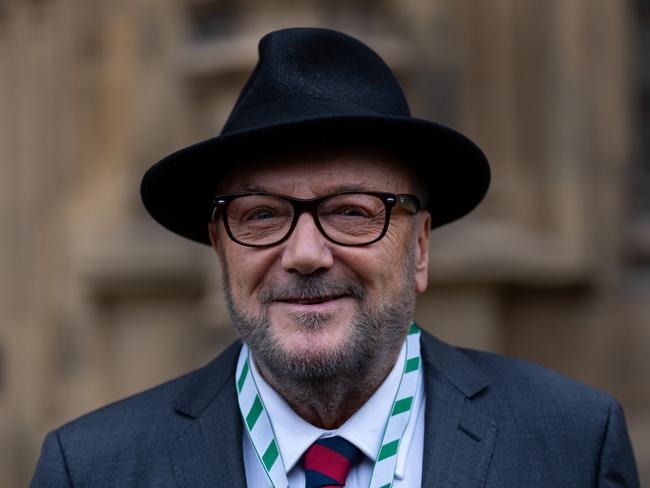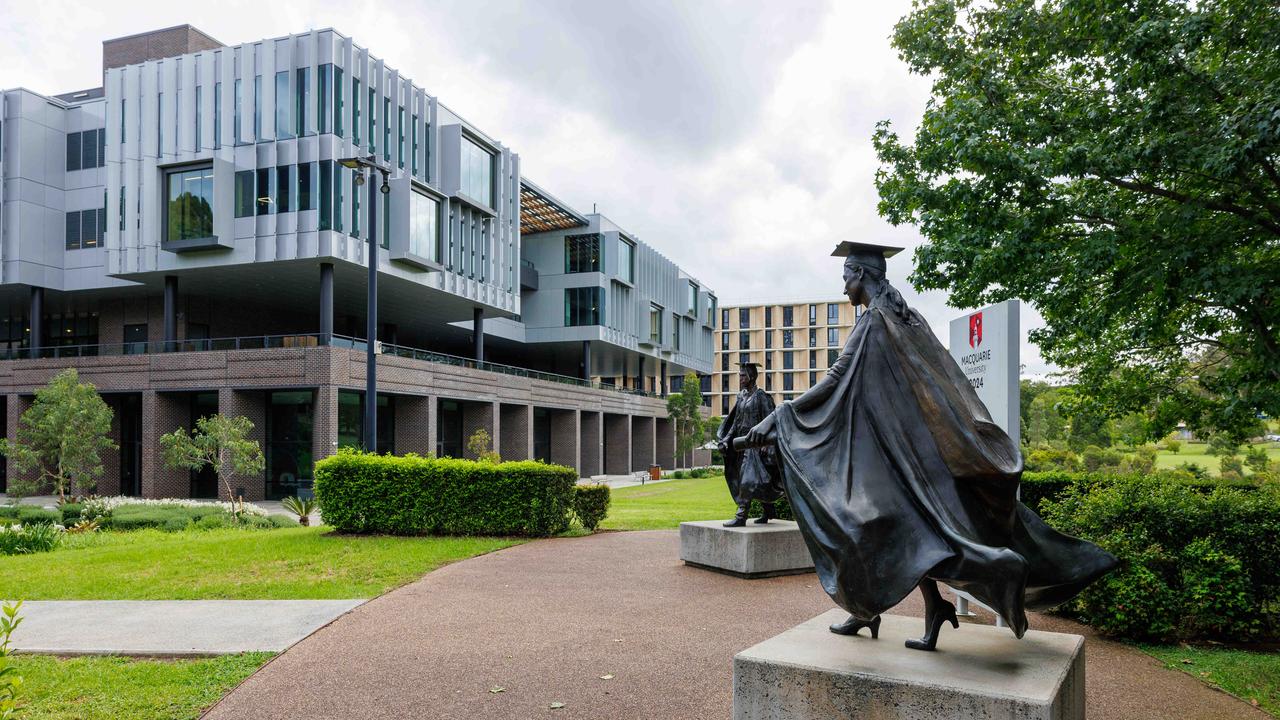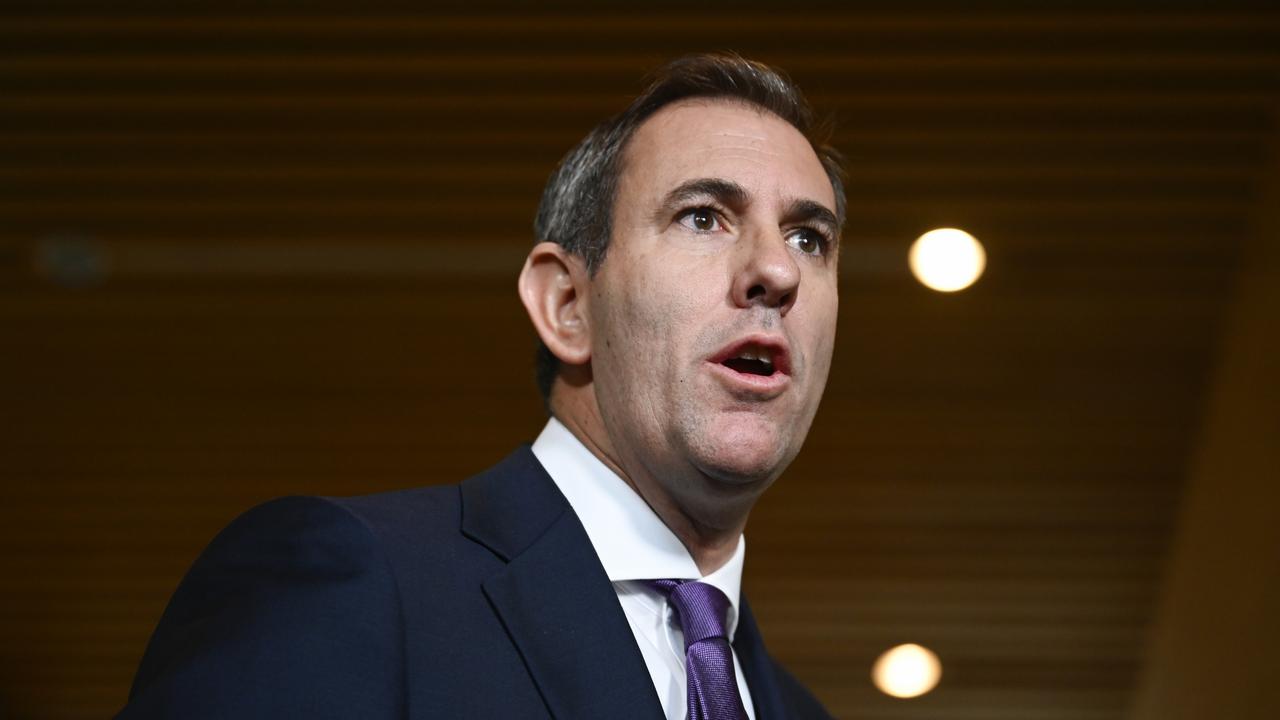Islamists in UK, Australia spreading anti-Semitism, destroying democracy
This pandemic of hatred is sweeping across our societies. It is monstrously, wickedly unfair to the Jews who are its victims, but it’s also an existential crisis in our civilisation.

This pandemic of hatred is sweeping across our societies. It is monstrously, wickedly unfair to the Jews who are its victims, but it’s also an existential crisis in our civilisation. For it puts the most irrational, ancient and shameful hatred at the heart of democratic life.
The situation grows worse, with governments ineffective in response. This has accelerated drastically since the October 7 Hamas terrorist atrocities against Israelis and the subsequent Israeli military operation in Gaza.
Sample some representative statements. In Britain, the Madina Masjid and Islamic Centre in Oldham posted a video of an imam labelling Jews as “the brothers of monkeys and apes”. The same imam prayed: “God rid us of the Jews, the usurpers, oppressors and aggressors.”
The Northampton Mosque and Islamic Centre asked Allah to “count them (Jews) and kill them, don’t let any of them survive”.
British broadcaster and writer Azzam Tamimi denied that Hamas had committed atrocities or harmed or kidnapped Israeli civilians. Instead this was all lies by “the Jews”. He said: “It has been the trend of the Jews to lie time and time again.”
Extreme reactions are common among activists but infect even mainstream British society.
In the recent by-election for Rochdale, the British Labour Party disendorsed its candidate, Azhar Ali, because he had claimed Israel deliberately allowed the Hamas attacks of October 7 to provide a pretext for an Israeli invasion of Gaza.
The seat has a large Muslim component. Before he withdrew, Ali was criticised locally because the British Labour Party was seen as too sympathetic to Israel.
The by-election was won by George Galloway, who had been expelled from the British Labour Party many years ago. He has a long association with the Lebanese Shia group Hezbollah, designated as a terrorist organisation in Britain and Australia.
Galloway had previously expressed support for Iraq’s Saddam Hussein and Syria’s Bashar al-Assad. Galloway campaigned heavily against Israel.

You could fill a book with British Islamist and Muslim reactions against Israel that cross the line into direct hostility to Jews.
It goes without saying that criticising Israel over Gaza is perfectly legitimate. Widely different views on this issue don’t imply ethnic hatred. Many of Israel’s strongest supporters want an early ceasefire, though not unconditionally. Many more believe Israel should allow vastly more humanitarian aid into Gaza.
The moral responsibility for Gaza’s terrible suffering lies with Hamas. The Wall Street Journal reported Hamas’s leader in Gaza, Yahya Sinwar, sent a message to a Hamas leadership meeting in Doha that Hamas had the Israelis exactly where it wanted them, that the war had led to massive international condemnation of Israel. Hamas could still win by outlasting the Israeli operation and emerging once more as leaders in Gaza and leaders, eventually, of the Palestinian national movement, he argued.
Thus, clearly, Hamas was more than willing to precipitate Gaza’s agony for its wider purposes.
Palestinian authorities in Gaza, subject to Hamas, say more than 30,000 Gazans have died. That’s bound to be an exaggeration but certainly many thousands have died. Hamas doesn’t distinguish between civilian and terrorist casualties. But Hamas leaders have told Egyptian officials they’ve lost 6000 fighters. Israelis believe they’ve killed more than 12,000 Hamas soldiers.
It’s natural such a terrible conflict arouses deep emotions. Every civilised person wants to reduce and end the suffering of Gaza’s civilians.
In terms of considering Islamist anti-Semitism, however, two things stand out: the reactions of many Islamist leaders in the West who supported the Hamas atrocities as soon as they happened, long before any Israeli retaliation, and the way the discourse in Islamic communities so quickly slips into actual anti-Semitism.
This is as true in Australia as in Britain. But whereas Britain has four million Muslims, roughly 6.5 per cent of its population, Australia has about 850,000, a bit over 3 per cent. Allowing for the difference in size, it’s as easy to find extremist Islamist discourse about Jews in Australia as in Britain.
Thus, straight after the Hamas atrocities, long before Israel’s Gaza operation, there was the now famous Sydney Opera House demonstration in which crowds screamed “F..k the Jews” and similar phrases.
Imam Ahmad Zoud at Lakemba mosque in southwest Sydney on December 22 called Jews “monsters” and said they “love to shed blood”. At the Al Madina Dawah Centre in Sydney’s Bankstown on December 22 an imam labelled Jews “descendants of pigs and monkeys”.
The extremism in language leads to extreme actions.
Of course, the overwhelming majority of Muslims in Australia are law-abiding, non-violent citizens. The same is true in Britain.
But even a small percentage who are radicalised, when they’re a small percentage of a big population, present big problems.
There’s a broader difficulty – the degree to which mainstream Islam contains an element of anti-Semitism within it, and contains also a desire for an Islamic political program ultimately to dominate. This can readily morph into non-violent sympathy for violent extremists.
Mike Burgess, director-general of ASIO, in his February 28 annual threat assessment, recorded the terrorist threat level as “Possible”. He said: “Sunni violent extremism poses the greatest religiously motivated violent extremist threat in Australia.”
It’s not the only threat. Burgess noted racial extremists also pose an increasing threat. That’s true in Britain and the US as well.
But the overwhelming majority of Australians killed by terrorists have been killed by Islamists. ASIO no longer uses the word Islamist. This is because the Islamic community, which is generally law-abiding and co-operates with police, resents any association of any derivate of the word Islam with terrorism.
In using the words “Sunni violent extremism” Burgess is not running away from labelling the problem accurately.
However, the Muslim community, if it doesn’t routinely and reflexively condemn every act of terrorist violence, and every word of anti-Semitic hatred, carried out in the name of any type of Islam, lacks credibility to dispute the term Islamism.
Islamism means the extremist political ideology that derives from particular interpretations of Islam. Not all Islamists are violent. It’s possible to want a state formally and theocratically ruled by Muslim law but to pursue this peacefully.
What has always been deeply problematic is how frequently mainstream Muslims regard Islamists as pious Muslims, even if they disagree with their methods.
Thus Indonesian cleric Abu Bakar Bashir was jailed in the early 2000s for involvement in the Bali bombings that killed Australians. The then Indonesian vice-president, Hamzah Haz, made much of his friendship with Bashir. This was because Bashir enjoyed a reputation as a pious Muslim, despite endorsing violence and terrorism.
Indonesia generally has a good record opposing terrorists and extremists, but Bashir for a time had great popularity. His diatribes against the West, often conspiratorial and nutty, such as accusing the CIA of carrying out the Bali bombings, fell on fertile ground in Indonesian Islam, even though it has famously a moderate Islamic tradition.
Burgess showed terrorists exploiting the conflict in Gaza: “Since the October 7 atrocities by Hamas the conflict has expanded with attacks carried out by a range of terrorists, particularly those aligned with Iran. We have seen attempts by ISIL (Islamic State) and al-Qa’ida to use the conflict to motivate attacks globally, and affiliates of both groups are active in Afghanistan, Africa, Southeast Asia and Europe.”
Muslims are themselves sometimes the victims of hatred, prejudice and violence, as in the Christchurch mosque massacre in 2019. It’s also the case that the vast majority of Muslims who die in terrorist incidents are killed by fellow Muslims. It’s absurd to imagine that Islamophobia is remotely as widespread, vicious or dangerous as the waves of anti-Semitism flooding our societies.
Among comparable nations, it’s Britain that has most had its democracy compromised by Islamism. London, with its large, concentrated Islamic minority, offers a perfect social laboratory. Contemporary London may well predict the future for societies such as ours.
It’s not Islamism alone that causes the problem. Extreme Islamism hates Western democratic and liberal societies and harbours anti-Semitism at its core. These ideological reflexes are now shared by the activist left in Western societies. Thus we have Climate Activists for Palestine and Queers for Palestine marching in objectively pro-Hamas demonstrations.

Anti-Semitism and the threat of violence are widespread. An almost random sample of headlines furnishes: an Israeli mental health expert being disinvited from a Queensland conference because organisers feared his presence could create security problems; Jewish Canadians attending a function at the Montreal Holocaust Museum were harassed and assaulted by pro-Palestinian demonstrators. At the Berkeley campus of the University of California a Jewish student function had to take shelter in an auditorium before being evacuated for attendees’ own safety after a violent mob smashed windows and screamed abuse.
This all looks very much like a modern version of anti-Jewish pogroms of 19th-century Europe. It’s the alliance of the ideological left with extreme Islamism that makes the situation so toxic. And then so much of the mainstream media is so comprehensively, and often inaccurately, hostile to Israel that this too bleeds into anti-Semitism.
Former British attorney-general Michael Ellis judges the BBC so hostile to Israel that it is “institutionally anti-Semitic”. Colin Rubenstein, head of the Australia/Israel & Jewish Affairs Council, makes a damning charge against the ABC. Its reporting is so one-sided and biased, in his view, that: “This type of constant, unprofessional and biased reporting undoubtedly contributes to an atmosphere that has seen a surge of anti-Israel and anti-Semitic activity in recent months.”
According to a survey by the Campaign Against Anti-Semitism, something like half of British Jews are considering migrating overseas because of fears for their own safety. Jewish school students in London dare not wear any school uniform or anything else that identifies them as Jewish. London’s weekly demonstrations about Gaza have become violent and dangerous.
Many British politicians report being threatened by Islamist extremists and their sympathisers. This has led one Conservative MP, Mike Freer, who is sympathetic to Israel, to announce that because of this intimidation he will retire from politics at the next election. Another Conservative, David Amess, was murdered in 2021 by an Islamic State supporter.
Recently the House of Commons was scheduled to vote on an anti-Israel motion from the Scottish National Party. Both Conservatives and Labour opposed it. It should have gone to a direct vote. But Speaker Lindsay Hoyle put a milder Labor motion on the same subject instead. It passed. At the time Hoyle did this, there was a roiling Islamist mob outside parliament and Hoyle said he feared for MPs’ lives if they were recorded voting against a pro-Palestinian motion.
The House of Commons, which had stood against Adolf Hitler, capitulated to intimidation by a violent mob. Thus is democracy compromised.
In case you think these judgments exaggerated, pay attention to British Prime Minister Rishi Sunak, who made a dramatic, short speech outside 10 Downing Street. He denounced both Islamist extremists and far-right groups, but his main concern was Islamists.
London’s pro-Palestinian demonstrations, he said, had “descended into intimidation, threats and planned acts of violence … Now our democracy itself is a target. Council meetings and local events have been stormed. MPs do not feel safe in their homes. Parliamentary conventions have been up-ended because of safety concerns.”
Last year I had the pleasure of interviewing Sunak over a couple of meetings over a couple of days. I’ve never met a more courteous, precise, thoughtful national leader. He’s the last person to exaggerate a threat. In his Downing Street speech, he decried that Jewish children are unsafe in a Jewish school uniform in London. He called on police to take back control of the streets and said his government would back them in firm action. And he said Britain would deport extremists where it could.
It sounds like a seminal moment. There have been many such prime ministerial statements, but the British state has for decades fared poorly in the battle against Islamist extremism.
In 2005, Islamist terrorists murdered 52 Londoners. Shortly after, Tony Blair said Britain would change the rules and defeat extremists. In 2013, two Islamist terrorists murdered Lee Rigby, a soldier. David Cameron vowed tough action and a new regime. In 2017 a suicide bomber killed 22 young people in Manchester. Theresa May delivered a withering statement promising to defeat the ideology behind the killings. Boris Johnson made similar promises after Amess was murdered.
Yet in all that time, immigration, much of it unregulated, from Muslim nations with strong traditions of radicalism has continued apace. Britain, even after Brexit, can’t establish control of its borders, like Joe Biden in America. Liberal courts, and liberal elite opinion, and much of the left internationally, no longer believe in enforceable national borders. This is a fundamental, reckless and devastating change by the left.
Nor will British and European courts allow the state to deport those who fail to establish refugee claims. In the past six years, Britain has actually removed about 1.3 per cent of those entering illegally.
Though its security forces run a million miles an hour, extremism continues to grow in Britain, which is a sign for the trends in all comparable societies.
Meanwhile, recorded anti-Semitic incidents in London have spiked catastrophically. The ideological left’s anti-Semitism is justified on the almost insane grounds that Israel is a colonising power, as though Jews have not lived there for thousands of years.
Nick Cohen, a shrewd analyst of the left, questions whether any centre-left party in government in Europe can survive without an effectively pro-Islamist foreign policy, simply because so many of its voters will be Muslims. Islamist activists in the US accuse Biden of being a war criminal for supporting Israel, as similarly some lawyers in Australia accuse Anthony Albanese and Penny Wong.
The Australian Greens are savagely hostile to Israel and echo key points of the Islamist agenda. So does France’s most left-wing mainstream party, Jean-Luc Melenchon’s LFI.
The grossly exaggerated idea of Islamophobia has been an effective rhetorical tool to prevent much discussion of the problem, much less action.
Taken altogether, these trends, as Sunak argues, are eroding democracy. The primary victims of anti-Semitism are Jews. But the recrudescence of this hideous hatred is an existential crisis for our whole society. No current trend line is good.








Extreme Islamism is powerfully corroding democracy in Britain, in Australia, in the US and Canada, in France and several other European countries. Extreme Islamism has virulent anti-Semitism at its core.